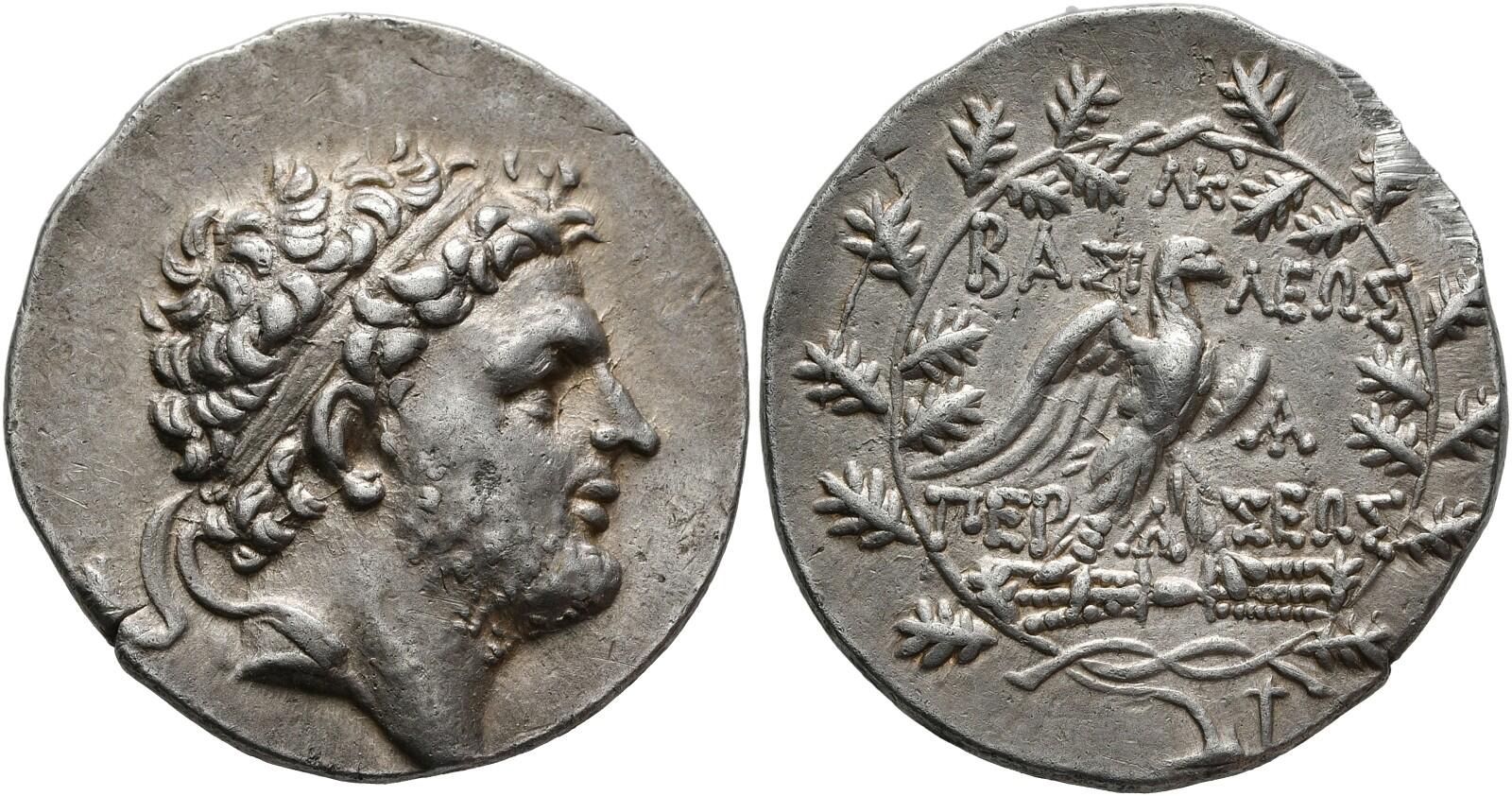120 BCE - 70 BCE | ΔIONYΣOY ΣΩTHPΩΣ MAPΩNITΩN
Overstriking coin
Maroneia on Perseus - Comptoir Général de Bourse, 34, 30 Apr. 2008, 91.jpg
[1]
Overstruck variety
Maroneia on Perseus - Comptoir Général de Bourse, 34, 30 Apr. 2008, 91 overstruck variety.jpg
[2]
|
|
Sale(s)Sale(s) ᵖ:
|
Comptoir Général de Bourse, 34, 30 Apr. 2008, 91
|
|
|
|
Description
| ObverseInscription or printing placed on the obverse.:
|
Wreathed head of young Dionysos right
|
ReverseInscription or printing placed on the reverse.:
|
ΔIONYΣOY ΣΩTHPΩΣ MAPΩNITΩN (Greek) Dionysos standing half-left, holding grapes and narthex stalks, monograms to inner left and right
|
Mint and issuing power
| MintIdentifies the place of manufacture or issue of a numismatic object.:
|
Maroneia
|
Ancient regionAncient region.
|
Thrace
|
Modern countryModern country: Greece
|
AuthorityIdentifies the issuing power. The authority can be "pretended" when the name or the portrait of X is on the coin but he/she was not the issuing power. It can also be "uncertain" when there is no mention of X on the coin but he/she was the issuing power according to the historical sources:
|
|
Chronology
| FromIdentifies the initial date in a range assigned in a numismatic context. 120 BCE toIdentifies the final date in a range assigned in a numismatic context.. 70 BCE
|
Hellenistic 323-30 BC  periodTime period of the numismatic object. periodTime period of the numismatic object.
|
Physical description
MetalThe physical material (usually metal) from which an object is made.: Silver 
|
WeightWeight of the numismatic object (in grams). in grams: 16.67g16,670 mg <br />
|
DenominationTerm indicating the value of a numismatic object. Examples: tetradrachm, chalkous, denarius.: Tetradrachm
|
AxisDescribes the directional relationship between the obverse and reverse of a numismatic object.: 12h"h" is not declared as a valid unit of measurement for this property.
|
| DiameterDescribes diameter of an object (in mm).: 35.5mm3.55 cm <br />
|
StandardStandard.: Attic
|
References
Description
| ObverseInscription or printing placed on the obverse.:
|
Diademed head right
|
ReverseInscription or printing placed on the reverse.:
|
BAΣI-ΛEΩΣ / ΠEP-ΣEΩΣ (Greek) Eagle, with wings spread, standing right on thunderbolt, mintmaster's monogram above and to right, monogram between legs, all within oak wreath
|
Mint and issuing power
Chronology
| FromIdentifies the initial date in a range assigned in a numismatic context. 179 BCE toIdentifies the final date in a range assigned in a numismatic context.. 168 BCE
|
Hellenistic 323-30 BC  periodTime period of the numismatic object. periodTime period of the numismatic object.
|
Physical description
| DenominationTerm indicating the value of a numismatic object. Examples: tetradrachm, chalkous, denarius. ᵖ:
|
Tetradrachm
|
StandardStandard. ᵖ:
|
Attic
|
References
References
- ^ Schönert-Geiss, Edith (1987), Die Münzprägung von Maroneia, Griechische Münzwerk. Schriften zur Geschichte und Kultur der Antike 26, Berlin.
- ^ Callataÿ, François de (2021), “On pattern and purpose of overstrikes of late Hellenistic tetradrachms in Thrace Macedonia”, in Ulrike Peter and Bernhard Weisser (eds.), Thrace. Local coinage and regional identity, Berlin Studies of the Ancient World 77, Berlin, Topoi, p. 263-289.
- ^ Mamroth, Alfred (1928), "Die Silbermünzen des Königs Perseus", Zeitschrift für numismatik 38, p.1-28

